20160811徐锦芬:外语教学类实证研究文章的撰写
结果—过程教学法在英语写作教学中的实证研究
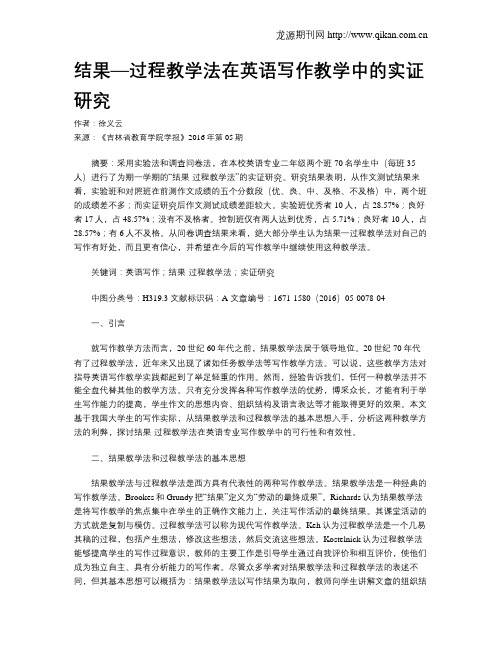
结果—过程教学法在英语写作教学中的实证研究作者:徐义云来源:《吉林省教育学院学报》2016年第05期摘要:采用实验法和调查问卷法,在本校英语专业二年级两个班70名学生中(每班35人)进行了为期一学期的“结果-过程教学法”的实证研究。
研究结果表明,从作文测试结果来看,实验班和对照班在前测作文成绩的五个分数段(优、良、中、及格、不及格)中,两个班的成绩差不多;而实证研究后作文测试成绩差距较大。
实验班优秀者10人,占28.57%;良好者17人,占48.57%;没有不及格者。
控制班仅有两人达到优秀,占5.71%;良好者10人,占28.57%;有6人不及格。
从问卷调查结果来看,绝大部分学生认为结果一过程教学法对自己的写作有好处,而且更有信心,并希望在今后的写作教学中继续使用这种教学法。
关键词:英语写作;结果-过程教学法;实证研究中图分类号:H319.3 文献标识码:A 文章编号:1671-1580(2016)05-0078-04一、引言就写作教学方法而言,20世纪60年代之前,结果教学法居于领导地位。
20世纪70年代有了过程教学法,近年来又出现了诸如任务教学法等写作教学方法。
可以说,这些教学方法对指导英语写作教学实践都起到了举足轻重的作用。
然而,经验告诉我们,任何一种教学法并不能全盘代替其他的教学方法。
只有充分发挥各种写作教学法的优势,博采众长,才能有利于学生写作能力的提高,学生作文的思想内容、组织结构及语言表达等才能取得更好的效果。
本文基于我国大学生的写作实际,从结果教学法和过程教学法的基本思想入手,分析这两种教学方法的利弊,探讨结果-过程教学法在英语专业写作教学中的可行性和有效性。
二、结果教学法和过程教学法的基本思想结果教学法与过程教学法是西方具有代表性的两种写作教学法。
结果教学法是一种经典的写作教学法。
Brookes和Grundy把“结果”定义为“劳动的最终成果”。
Richards认为结果教学法是将写作教学的焦点集中在学生的正确作文能力上,关注写作活动的最终结果。
徐锦分-16.6.4-复旦大学研修班-徐锦芬
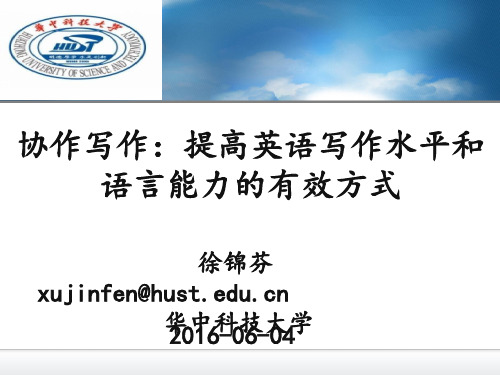
LOGO
Swain的输出假说
Swain(1993)通过加拿大“沉浸式教学”项目发现, 仅仅有可理解性输入还不足以保证二语学习的成功, 还需要“可理解性输出”,并提出了“输出假说”, 强调语言输出在二语习得过程中的重要作用。
LOGO
Long(1996)吸收了Swain的“输出假说”, Schmidt(1994)的“注意假说”以及Pienemann(1989) 的语言加工能力理论的核心思想,对互动假说作了更 新,指出意义协商是通过连接输入、学习者大脑机能, 尤其是选择性注意以及输出来促进语言习得。
研究表明,这样可能会促使学习者在大脑中建构更加 清晰、一致的知识表征,并在这个过程中促进理解能 力(van Lier, 1996)。同时,接触到的新观点或知识 也可能被学习者吸收内化成为自己的知识。
LOGO
国外关于协作写作的实证研究
协作写作的认知过程及影响因素 协作写作对文本质量及学习者写作水平的影响 协作写作对二语学习的促进作用 学习者的态度和感知
文献很少,而且存在合作学习与协作学习概念混 淆不清、理论探讨缺乏深度、实证研究匮乏而零 散、总体研究质量亟待提高等问题。
LOGO
协作学习、合作学习的 定义及特点
“协作”与“合作”:其区别在于完成全部任 务成员间劳动分工的程度(Dillenbourg, 1999)
“协作”是一种协调性的、同步的活动,成员共同工 作以完成全部学习任务。在此过程中,他们之间没有 稳定的分工,相互间的角色也经常转换。
注重学生对知识的 注重教师对合作学
协同建构
习的设计、组织和
引导
任务 性质
开放性更强,适合 开放性不强,主要 非基础性知识(即 适合基础性知识 需要更多推理和质 (即已被人们认可 疑能力)的学习和 的事实)的学习 批判性思维能力的 培养
关于《论外语教师教育的创新研究方法》一文的反思
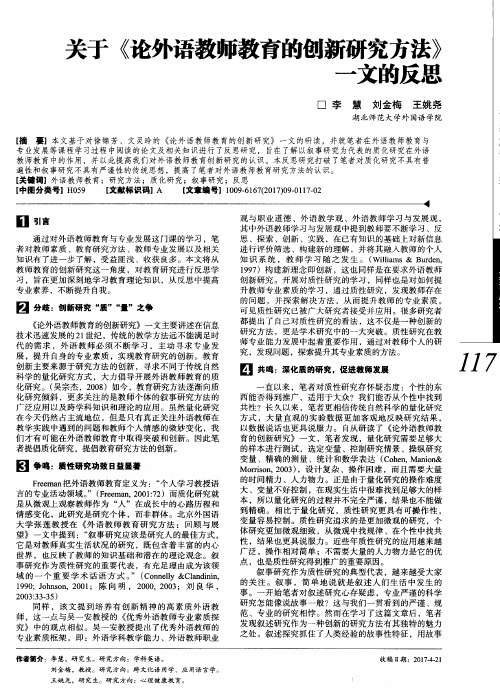
1 1
l争鸣: 质性研究功效日 益显著
F r e e ma n把外语教 师教育定 义为 :“ 个人学 习教授语 言的专业活动领 域。 ”( F r e e ma n , 2 0 0 1 : 7 2 )而质化研究就 是从微观 上观察教 师作为 “ 人 ”在成 长中 的心路 历程和 情感变化 ,此研究 是研究个体 ,而非群 体 。北 京外 国语 大学 张 莲教 授 在 《 外语 教 师教 育 研究 方 法 :回顾 与展
口 引 言
通过对 外语教师 教育与专 业发展这 门课 的学习 ,笔
者 对 教 师 素 质 、教 育 研 究 方 法 、教 师 专 业 发 展 以 及 相 关 知 识 有 了进 一 步 了解 ,受 益 匪 浅 、收 获 良多 。本 文 将 从 教师教育 的创新研 究这一 角度 ,对教 育研 究进行 反思学 习 ,旨在更 加深刻 地学 习教 育理论知识 ,从反 思中提高
关于 《 论外语教师教育的创新研究方法》 文的反思
一
口 李
慧
刘金梅
王姚尧
湖北师 范大 学外 国语学院
【 摘 要】本 文基于对徐锦 芳 、文 灵玲 的 《 论 外语 教师教育 的创 新研 究》 一文 的研读 ,并就笔者在 外语教师教育 与 专业发展等课程 学习过程 中阅读 的论文及相关知识进行 了反思研 究, 旨在 了解以叙 事研 究为代 表的质化研 究在 外语 教 师教育 中的作用 ,并以此提 高我们对外语教师教育创新研 究的认识 。本反 思研 究打破 了笔者 对质 化研 究不具有 普 遍性和叙事研 究不具有严谨性 的传统 思想 ,提高 了笔者对 外语教 师教 育研 究方法的认 识。 【 关键词】外语教 师教 育;研究方法 ;质化研究 ;叙事研究 ;反思 【 中图分类号】H0 5 9 【 文献标识码】A 【 文章 编号】1 0 9 . 6 1 6 7 ( 2 0 1 7 ) 0 9 — 0 1 1 7 - 0 2
实用英语教学法教程徐锦芬笔记第四章
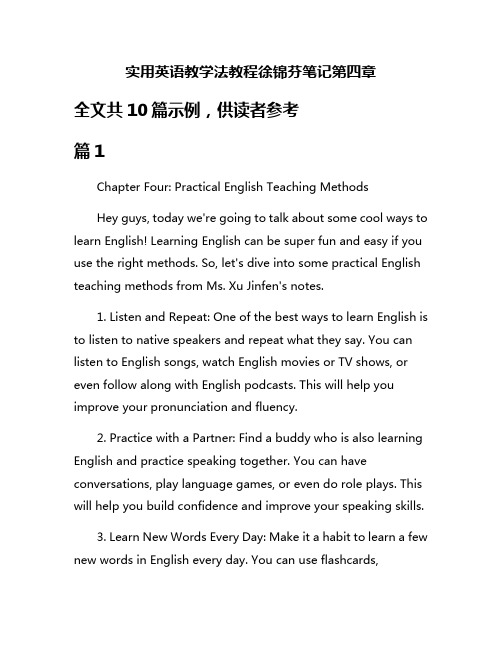
实用英语教学法教程徐锦芬笔记第四章全文共10篇示例,供读者参考篇1Chapter Four: Practical English Teaching MethodsHey guys, today we're going to talk about some cool ways to learn English! Learning English can be super fun and easy if you use the right methods. So, let's dive into some practical English teaching methods from Ms. Xu Jinfen's notes.1. Listen and Repeat: One of the best ways to learn English is to listen to native speakers and repeat what they say. You can listen to English songs, watch English movies or TV shows, or even follow along with English podcasts. This will help you improve your pronunciation and fluency.2. Practice with a Partner: Find a buddy who is also learning English and practice speaking together. You can have conversations, play language games, or even do role plays. This will help you build confidence and improve your speaking skills.3. Learn New Words Every Day: Make it a habit to learn a few new words in English every day. You can use flashcards,vocabulary apps, or even write the words down in a notebook. This will help you expand your vocabulary and improve your reading and writing skills.4. Use English in Real-Life Situations: Try to use English in your everyday life as much as possible. Whether it's ordering food at a restaurant, asking for directions, or chatting with a friend, practice using English in real-life situations. This will help you become more comfortable with the language.5. Set Goals and Track Your Progress: Set specific goals for your English learning journey and track your progress along the way. This could be reaching a certain level of fluency, passing a language exam, or simply having a conversation with a native speaker. Celebrate your achievements and keep pushing yourself to improve.Remember, learning English is a journey and it's important to be patient and consistent. By using these practical English teaching methods, you'll be well on your way to mastering the language. Keep practicing and you'll be speaking like a pro in no time!篇2Chapter 4: Fun Ways to Learn EnglishHey guys! Today we're going to talk about some super cool and fun ways to learn English. Learning a new language can be tough, but with these tips, it will be easy peasy lemon squeezy!1. Singing Songs: Did you know that singing songs in English can help you remember new words and phrases? Pick your favorite English songs and sing along. It's a fun way to practice your pronunciation and improve your listening skills.2. Watching Cartoons and Movies: Who doesn't love watching cartoons and movies? Try watching them in English with subtitles on. You'll pick up new words and phrases while having a blast.3. Playing Games: There are lots of fun English learning games online that can help you improve your vocabulary and grammar. Whether it's word puzzles, quizzes, or memory games, playing games is a great way to practice English.4. Talking to Friends: Practice speaking English with your friends or family members who speak English. Try having a conversation in English or playing games like charades to practice your communication skills.5. Reading Books and Comics: Reading English books and comics is a fun way to improve your reading skills and expandyour vocabulary. Choose books that interest you and have fun exploring new worlds through words.Remember, learning English can be fun and easy if you make it a part of your daily routine. So keep practicing and before you know it, you'll be speaking English like a pro! Good luck!篇3Chapter 4: Fun Ways to Learn EnglishHey guys! Today, let's talk about some super cool and fun ways to learn English. Learning a new language can be hard, but with these tips, it'll be a piece of cake!1. Watch English movies and TV shows: Watching movies and TV shows in English is a great way to improve your listening skills and learn new words. Plus, it's super fun!2. Play English games: There are tons of fun games online that can help you learn English. Try playing word games, puzzles, or even online quizzes to practice your vocabulary and grammar.3. Listen to English music: Listening to English songs is a fun way to improve your pronunciation and learn new phrases. Sing along and dance to your favorite tunes – you'll be a pro in no time!4. Read English books and comics: Reading English books and comics is a great way to expand your vocabulary and improve your reading skills. Plus, it's a fun way to escape into different worlds and stories.5. Practice with a friend: Find a friend who is also learning English and practice speaking together. You can have conversations, play language games, or even challenge each other to see who knows more words.6. Use language learning apps: There are many great apps out there like Duolingo, Babbel, and Rosetta Stone that can help you learn English in a fun and interactive way. Try them out and see which one works best for you.Remember, learning English can be fun and exciting if you find ways to make it enjoyable. So, grab a friend, turn on some music, and start practicing – you'll be speaking like a native in no time! Good luck!篇4Title: Practical English Teaching Methods by Xu Jinfen Chapter 4 SummaryHey guys, today I'm gonna tell you about Chapter 4 of Xu Jinfen's Practical English Teaching Methods book. This chapter is all about fun and effective ways to teach English to primary school students. Let's dive in!First off, Xu Jinfen talks about using games to teach English. Games are a great way to make learning fun and engaging. You can play things like word bingo, memory matching, or even do role-playing activities. This helps students practice their English in a relaxed and enjoyable setting.Next, Xu Jinfen emphasizes the importance of storytelling in language learning. Stories captivate students' attention and help them remember vocabulary and grammar rules better. You can read stories aloud, act them out, or even have the students create their own stories.Another tip Xu Jinfen gives is to incorporate technology into your lessons. Using educational apps, online resources, and videos can make learning more interactive and dynamic. Students will love using technology to practice their English skills.Lastly, Xu Jinfen suggests incorporating real-life experiences into your lessons. Take your students on field trips, have them do projects, or even just have conversations with them in English.This helps them see the practical value of learning English and motivates them to continue improving.So there you have it, guys! Chapter 4 of Xu Jinfen's book is full of great tips for teaching English to primary school students. Remember to make your lessons fun, interactive, and relevant to their everyday lives. Happy teaching!篇5Chapter 4 Key PointsHey everyone! Today we're going to talk about some super important stuff in English teaching! So get ready to take some notes!1. Teaching VocabularyWhen we learn English, we need to know lots of words, right? So teachers always help us learn new vocabulary in fun ways. We can play games, do puzzles, or even make flashcards to remember the words better!2. Using Visual AidsVisual aids are pictures or objects that help us understand new words or ideas. It's like when our teacher shows us a pictureof a cat when we learn the word "cat". It makes learning so much easier!3. Interactive ActivitiesLearning English shouldn't be boring, right? That's why teachers use interactive activities to make it more fun! We can do role plays, group work, or even sing songs in English class. It's like playing while learning!4. Error CorrectionSometimes we make mistakes when we speak English, and that's totally okay! Our teacher will help us by correcting our errors gently. This way, we can learn from our mistakes and improve our English skills.5. Providing FeedbackFeedback is when our teacher tells us how we're doing in English class. They will praise us when we do well and give us tips for improvement when needed. It's like having a cheerleader to support us in learning English!So remember these key points when learning English, and you'll be a pro in no time! Keep practicing and never give up! Good luck, everyone!篇6Chapter Four: Fun Ways to Learn EnglishHey guys! Today we're going to talk about some super fun ways to learn English. Learning a new language doesn't have to be boring, you know? So let's dive into some cool tips to make learning English more enjoyable!1. Watch English movies or TV shows: This is a great way to improve your listening skills and pick up some new vocabulary. You can even watch with subtitles to help you understand better.2. Listen to English songs: Music is a great way to learn new words and phrases. Try singing along to your favorite songs and pay attention to the lyrics.3. Play language games: There are lots of fun games online that can help you practice your English skills. Games like word puzzles, crosswords, and matching games are not only entertaining but also educational.4. Read English books: Reading is a fantastic way to improve your vocabulary and grammar. You can start with simple children's books and gradually move on to more advanced materials.5. Practice with a language partner: Find a friend who is also learning English and practice speaking together. This will help you build confidence and improve your communication skills.6. Use language learning apps: There are tons of apps out there that can help you learn English in a fun and interactive way. Try downloading Duolingo or Babbel to supplement your learning.Remember, the key to learning English is to practice regularly and have fun with it. So don't be afraid to make mistakes and keep pushing yourself to improve. Happy learning!篇7Chapter 4: Fun Ways to Learn English!Hi everyone! Today, I'm going to tell you all about some super fun ways to learn English. Learning English doesn't have to be boring or difficult - it can actually be really fun and exciting. So let's dive right in and explore some cool techniques to improve your English skills!1. Singing Songs: One of the best ways to learn English is by singing songs. Choose your favorite English songs and singalong to them. This will help you improve your pronunciation and vocabulary. Plus, it's a lot of fun!2. Watching Movies and TV Shows: Another great way to learn English is by watching English movies and TV shows. You can try turning on subtitles at first to help you understand better. Pay attention to how the actors speak and try to mimic their accents.3. Playing Word Games: Word games like crossword puzzles, word searches, and Scrabble can be a fun way to improve your vocabulary and spelling. You can play these games with your friends or family members to make it even more enjoyable.4. Reading Books and Comics: Reading English books and comics is a fantastic way to improve your reading and comprehension skills. Start with simple books or comics that are suitable for your level, and gradually work your way up to more challenging material.5. Engaging in Conversations: Practice speaking English with your classmates, friends, or family members. Try to have conversations in English as much as possible, even if it's just for a few minutes each day. This will help you become more confident in speaking English.6. Using Language Learning Apps: There are many apps available that can help you learn English in a fun and interactive way. Some popular apps include Duolingo, Babbel, and Rosetta Stone. These apps offer games, quizzes, and exercises to make learning English enjoyable.Remember, the key to learning English is to practice regularly and stay motivated. With these fun techniques, you'll be improving your English skills in no time. Keep up the good work, and soon you'll be speaking English like a pro! Good luck!篇8Chapter Four: Fun Ways to Teach EnglishHi everyone! Today I'm going to share with you some super fun ways to learn English. Learning a new language can be really exciting if you make it fun and interesting. So let's get started!1. Singing and DancingOne of the best ways to remember words and phrases is through music. You can learn English songs and sing along while dancing. It's a great way to improve your pronunciation and listening skills. Plus, it's a lot of fun!2. StorytellingAnother fun way to learn English is by telling stories. You can create your own stories or even act out scenes from movies or books. This can help you improve your speaking and writing skills, as well as your creativity.3. Role-Playing GamesRole-playing games are a fantastic way to practice speaking English in a real-life situation. You can pretend to be different characters and have conversations in English. It's a fun and interactive way to improve your communication skills.4. Word GamesPlaying word games like crossword puzzles, word searches, and Scrabble can help you expand your vocabulary and improve your spelling. You can play these games with friends or classmates for even more fun.5. Watching English Movies and TV ShowsWatching movies and TV shows in English is a great way to improve your listening skills and learn new words and expressions. You can even try watching with subtitles to help you understand better.6. Cooking TogetherCooking is a fun way to learn English while also learning new recipes and food vocabulary. You can follow English recipes and practice speaking and understanding cooking instructions.7. Outdoor ActivitiesOutdoor activities like hiking, picnicking, or playing sports can also be a fun way to practice English. You can have conversations with your friends in English while enjoying the outdoors.So there you have it, some fun ways to learn English. Remember to keep practicing and trying new things to improve your language skills. Have fun and enjoy the journey of learning English!篇9Chapter Four of Ms. Xu Jinfen's Practical English Teaching Method NotesHey guys! Today I'm gonna talk about Chapter Four of Ms. Xu Jinfen's notes on teaching English. It's all about different teaching methods that we can use to make learning English more fun and interesting. Let's dive right in!1. Total Physical Response (TPR): This method is all about using actions and movements to help students remember vocabulary and phrases. For example, if you want to teach the word "jump", you can demonstrate it by actually jumping up and down. It's a super fun way to learn!2. Communicative Language Teaching (CLT): This method focuses on using English in real-life situations. Students get to practice speaking and listening in a natural and authentic way, which can help improve their communication skills.3. Task-Based Learning: This method involves giving students specific tasks to complete using English. For example, you could ask them to plan a day out in English, or create a dialogue between two characters. It's a great way to make learning more interactive and engaging.4. Audio-Lingual Method: This method emphasizes listening and speaking practice. Students listen to audio recordings and then repeat what they hear, helping them improve their pronunciation and fluency.5. Grammar-Translation Method: This method focuses on teaching grammar rules and translating between English and the students' native language. While it can be useful forunderstanding grammar concepts, it's important to balance it with other more interactive methods.So there you have it, some cool teaching methods to try out in your English classes. Remember, the key is to keep things fun and engaging to help students learn and enjoy English! Keep up the good work, guys!篇10Chapter Four: Practical English Teaching MethodsHey guys! Today we're going to talk about some super cool and fun ways to learn English! Are you ready? Let's go!1. Total Physical Response (TPR): This method involves using physical movements to help students remember vocabulary and grammar. For example, you can act out actions like running, jumping, or washing your hands while saying the words aloud. This makes learning English more interactive and engaging!2. Picture Cards: Picture cards are a great way to help students associate words with images. You can show them a picture of a cat and say the word "cat", or show them a picture of a car and say the word "car". This helps students visualize thewords and make connections between the images and the vocabulary.3. Songs and Rhymes: Who doesn't love singing and dancing? Using songs and rhymes in English teaching can be really effective. Students can learn new words and phrases through catchy tunes and repetitive lyrics. It's a fun way to practice pronunciation and improve listening skills!4. Role-Playing: Role-playing activities are a fun way to practice speaking and listening skills. Students can pretend to be different characters and have conversations in English. For example, they can play the roles of a doctor and a patient, or a teacher and a student. This helps students improve their speaking fluency and confidence.5. Games: Games are always a hit in the classroom! You can play games like word puzzles, charades, or memory matching to reinforce vocabulary and grammar. Games make learning English enjoyable and help students stay motivated.So there you have it, some awesome tips for teaching English in a fun and effective way. Remember, the key is to make learning English enjoyable and interactive. Keep practicing and you'll be speaking like a pro in no time! Good luck, everyone!。
谈外语教学实证研究
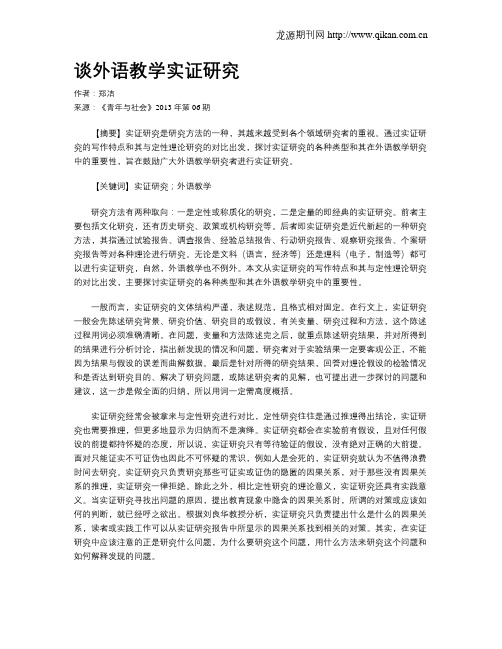
谈外语教学实证研究作者:郑洁来源:《青年与社会》2013年第06期【摘要】实证研究是研究方法的一种,其越来越受到各个领域研究者的重视。
通过实证研究的写作特点和其与定性理论研究的对比出发,探讨实证研究的各种类型和其在外语教学研究中的重要性,旨在鼓励广大外语教学研究者进行实证研究。
【关键词】实证研究;外语教学研究方法有两种取向:一是定性或称质化的研究,二是定量的即经典的实证研究。
前者主要包括文化研究,还有历史研究、政策或机构研究等。
后者即实证研究是近代新起的一种研究方法,其指通过试验报告、调查报告、经验总结报告、行动研究报告、观察研究报告、个案研究报告等对各种理论进行研究。
无论是文科(语言,经济等)还是理科(电子,制造等)都可以进行实证研究,自然,外语教学也不例外。
本文从实证研究的写作特点和其与定性理论研究的对比出发,主要探讨实证研究的各种类型和其在外语教学研究中的重要性。
一般而言,实证研究的文体结构严谨,表述规范,且格式相对固定。
在行文上,实证研究一般会先陈述研究背景、研究价值、研究目的或假设,有关变量、研究过程和方法,这个陈述过程用词必须准确清晰。
在问题,变量和方法陈述完之后,就重点陈述研究结果,并对所得到的结果进行分析讨论,指出新发现的情况和问题,研究者对于实验结果一定要客观公正,不能因为结果与假设的误差而曲解数据。
最后是针对所得的研究结果,回答对理论假设的检验情况和是否达到研究目的、解决了研究问题,或陈述研究者的见解,也可提出进一步探讨的问题和建议,这一步是做全面的归纳,所以用词一定需高度概括。
实证研究经常会被拿来与定性研究进行对比,定性研究往往是通过推理得出结论,实证研究也需要推理,但更多地显示为归纳而不是演绎。
实证研究都会在实验前有假设,且对任何假设的前提都持怀疑的态度,所以说,实证研究只有等待验证的假设,没有绝对正确的大前提。
面对只能证实不可证伪也因此不可怀疑的常识,例如人是会死的,实证研究就认为不值得浪费时间去研究。
大学英语课堂小组互动策略培训实验研究_徐锦芬
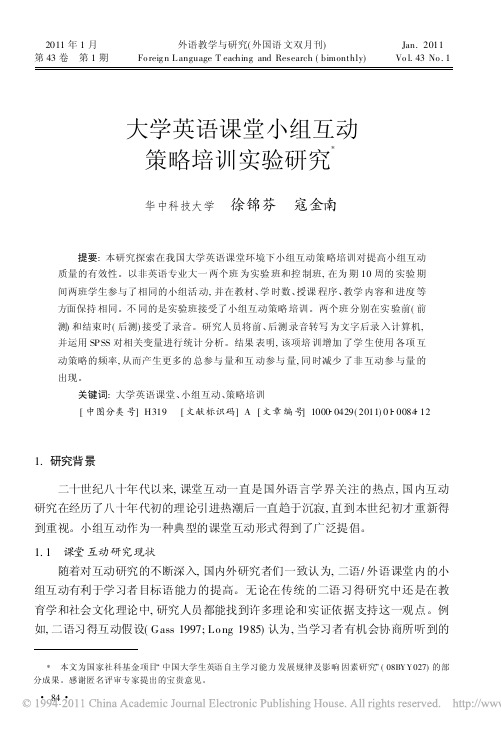
2011年1月第43卷 第1期外语教学与研究(外国语文双月刊)Fo reig n L anguage T eaching and Research(bimonthly)Jan.2011Vo l.43No.1大学英语课堂小组互动策略培训实验研究*华中科技大学 徐锦芬 寇金南提要:本研究探索在我国大学英语课堂环境下小组互动策略培训对提高小组互动质量的有效性。
以非英语专业大一两个班为实验班和控制班,在为期10周的实验期间两班学生参与了相同的小组活动,并在教材、学时数、授课程序、教学内容和进度等方面保持相同。
不同的是实验班接受了小组互动策略培训。
两个班分别在实验前(前测)和结束时(后测)接受了录音。
研究人员将前、后测录音转写为文字后录入计算机,并运用SP SS对相关变量进行统计分析。
结果表明,该项培训增加了学生使用各项互动策略的频率,从而产生更多的总参与量和互动参与量,同时减少了非互动参与量的出现。
关键词:大学英语课堂、小组互动、策略培训[中图分类号]H319 [文献标识码]A[文章编号]1000 0429(2011)01 0084 12 1.研究背景二十世纪八十年代以来,课堂互动一直是国外语言学界关注的热点,国内互动研究在经历了八十年代初的理论引进热潮后一直趋于沉寂,直到本世纪初才重新得到重视。
小组互动作为一种典型的课堂互动形式得到了广泛提倡。
1.1 课堂互动研究现状随着对互动研究的不断深入,国内外研究者们一致认为,二语/外语课堂内的小组互动有利于学习者目标语能力的提高。
无论在传统的二语习得研究中还是在教育学和社会文化理论中,研究人员都能找到许多理论和实证依据支持这一观点。
例如,二语习得互动假设(Gass1997;Lo ng1985)认为,当学习者有机会协商所听到的*本文为国家社科基金项目 中国大学生英语自主学习能力发展规律及影响因素研究 (08BYY027)的部分成果。
感谢匿名评审专家提出的宝贵意见。
外语教学研究方法及论文写作

撰写结论
总结研究发现和贡献,指出研究局限和未来 研究方向。
参考文献
列出文中引用的学术论文、专著、报告等, 格式要符合学术规范。
04 论文写作技巧
清晰的研究问题
明确研究目的
确立研究目标,明确要解决的具体问题,这是 论文的出发点和核心。
限定研究范围
避免问题过于宽泛,要具体、明确地界定研究 对象的范围。
变革性混合方法设计
通过整合定量和定性的数据收集和分析方法,以推动理论的发展和创新。这种方法强调在研究过程中 不断反思和调整研究设计,以适应新的数据发现和分析结果。
03 论文写作步骤
确定研究问题
明确研究领域
选择自己感兴趣且具有研究价值的领域,如语言教学、语言习得、 跨文化交际等。
缩小研究范围
在选定领域内,进一步确定具体的研究问题,如某种教学方法的有 效性、学习者个体差异对语言学习的影响等。
随着科技的不断进步和学术研究的深 入发展,外语教学研究方法和论文写 作将不断面临新的挑战和机遇。未来 研究可以关注新兴技术如人工智能、 大数据等在外语教学中的应用,探索 新的研究方法和论文写作范式,推动 外语教学研究领域的创新和发展。
THANKS FOR WATCHING
感谢您的观看
讨论
对研究结果进行解释和讨论,与前人研究对比, 提出新见解。
结论
总结研究成果,指出研究局限性,建议未来研究方向。
精确的语言表达
使用学术语言
运用专业术语,保持语言准确性和客观性。
避免冗余和重复
简洁明了地表达观点,删除不必要的重复和 冗余信息。
注重逻辑连贯
保持句子和段落之间的逻辑联系,使论文整 体结构紧密。
而揭示外语教学现象中的数量关系。
无锡徐锦芬大学英语课堂研究内容与方法

9. 我国大学英语课堂小组互动模式研究, 《外语教学》在审
10. An investigation into the relationship between the use of interaction strategies and second language development in Chinese college English classrooms, TESOL Quarterly. 在审
素材、数据、问题、案例等。
发表的代表性教学科研论文(自主学习):
1. 非英语专业大学生自主学习能力调查与分析,《外语教学与研究》2004年第1期 2. 大学生自主英语学习能力模糊综合评价,《高等工程教育研究》2004年第3期 3. 国内外“学习者自主”研究述评,《外语界》2004年第4期 4. 培养大学新生自主英语学习能力的“三维一体”教学模式,《外语教学》2010 年第6期 5. 大学生社会支持感、班级归属感与英语自主学习能力的关系研究,《外语界》 2011年第5期 6. 外语学习中的积极互赖与自主学习能力的关系研究,《解放军外国语学院学 报》2012年第2期 7. 外语教学中的批判性合作自主,《外语教学》2012年第3期 8. 国外语言自主学习研究30年,《外语电化教学》2013年第1期 9. 课外合作学习对大学生英语自主学习能力影响的实证研究,《解放军外国语学 院学报》2013年第5期 10. 学习者可控因素对大学生英语自主学习能力的影响研究,《现代外语》2014年 第 4期 11.目标定向对英语自主学习能力的影响及自我效能感的中介,《中国外语》2014 年第4期 12. 我国早期自主学习思想探析,《语言教育》2014年第2期 13. 我国大学生英语自主学习能力现状与思考,《语言教育》2014年第4期
- 1、下载文档前请自行甄别文档内容的完整性,平台不提供额外的编辑、内容补充、找答案等附加服务。
- 2、"仅部分预览"的文档,不可在线预览部分如存在完整性等问题,可反馈申请退款(可完整预览的文档不适用该条件!)。
- 3、如文档侵犯您的权益,请联系客服反馈,我们会尽快为您处理(人工客服工作时间:9:00-18:30)。
• Ethnographic(民族志),基于课堂实地观察,以及来自教师和 学习者的回顾和内省报告的研究;
• Correlational(相关性),寻求在不同变量间建立联系的研究。
3、外语教学类实证研究文章的撰写
实验性研究(通常被用来检验某种教学方法的有效性) 真正的实验性研究需要满足下列要求: 1)提出并清晰定义自变量和因变量;
3、外语教学类实证研究文章的撰写
2)实证文章结构
• • 标题 摘要
•
正文
1)引言 2)文献综述/研究背景 3)研究设计
4)结果与讨论
5)结语 • 参考文献
3、外语教学类实证研究文章的撰写
标题(研究的核心内容、研究视角) 例如:认知语言学角度的二语习得研究:观点、现状与展望 (蔡金亭、朱立霞,2010) 基于动态系统理论的课堂二语习得研究:理论框架与研
3、外语教学类实证研究文章的撰写
-- 实证研究方法
-- 实证研究文章结构 -- 文章各部分实例分析
3、外语教学类实证研究文章的撰写
1)实证研究采取的方法主要有:
• Descriptive(描述性),研究在课堂环境下教师和学习者产出的 不同类型的语言; • Experimental(实验性),给学习者实施教学干预,并测量不同 教学干预带来的学习效果;
例 3: 如果你对“专业学习共同体-- 教师专业发展的途径之一”感兴趣, 那么: “专业学习共同体对外语教师教学能力发展的影响研究”
2)个人的教学经历与兴趣
例 4: 如果你对文秋芳教授提出的“产出导向法”感兴趣, 那么: “产出导向法在大学英语教学中的应用研究”
总之,外语教学实践中,哪里有困惑,哪里就能找到研究题目。
论文结构
• 阅读并分析下面的题目与摘要(内容、方法、结果) 题目2:基于云班课APP的大学英语听力翻转课堂教学实践探究 摘要2: 移动互联网近些年来得到迅速发展,其具体体现之一—— APP对提升新时期课堂教学质量提供了新的思路。而听力教
学一直以来是英语语言教学的一个瓶颈,因此,本研究尝试 将移动学习对接翻转课堂并应用于听力教学中,在具体分析 学习者、大学英语听力教材、移动APP的教育功用的基础上, 提出并实践了基于移动APP的大学英语听力翻转课堂教学模 式。一学年的实验数据表明,该模式较传统听力教学方式更 有助于提高学生的听力水平。
-- 20世纪五六十年代:听说读写4种技能的总和; -- 70年代:交际能力;
-- 八九十年代:又增加了策略能力。 如果你选择70年代的理论定义,即交际能力,而用语法 翻译法的测试卷来测量学生的外语水平,显然,理论定义和 操作定义不一致,因为语法翻译法的测试卷来无法测出学生 的交际能力。
例如:对自主学习的理论定义有很多: • Holec (1981:3)把自主学习定义为“能负责自己学习的能力(the ability to take charge of one’s own learning)” • Dickinson(1987:11)将“自主”定义成“学习者对所有学习上的决定 和这些决定的完成负完全责任的情形” • Broady and Kenning (1996)认为,学习者自主的概念应该包含三个方 面的内容,即责任、不依赖教师的学习以及选择。 • Benson(2001) 将自主学习界定为“对自己的学习进行控制的能 力”(the capacity to take control of one’s own learning)
外语教学类实证研究文章的撰写
华中科技大学 徐锦芬
问题:
(1)撰写外语教学类实证研究文章的困难有哪些?
(2)外语教学类实证研究文章的结构是怎样的?
外语教学类实证论文普遍存在的问题
1)选题不好
2)文献回顾与研究问题脱节
3)文章思路清晰度不够,有些概念混在一起,尤其是忽略对关键 术语的界定
4)研究方法欠标准(工具不准、抽样不够、统计方法欠妥等)
2、选题来源
2)个人的教学经历与兴趣
例1:大学英语听说课堂小组活动,那么小组互动质量如何?对 学生的语言习得是否有促进作用?等等,因此就有了以下论 文题目: -- “大学英语课堂小组互动策略培训实验研究” -- “不同结对模式对大学英语课堂生生互动影响的实证研究”
-- “大学英语课堂小组互动中的同伴支架研究” -- “大学英语课堂小组互动模式研究”
2)通过某种形式的介入(即“训练/干预”)调查自变量对因变 量的效应;
3)形成实验组和控制组;
4)受试者被随机分布到不同的小组; 5)通过前侧和后侧(即时后侧与延时后侧)求出两组测试分数 是否有显著性差异。 但实际上大多数基于课堂的研究都不是真正的实验,而是准 实验研究。因为随机将受试分配至各个小组通常是不可能的, 大多数实验性研究是在常规课堂环境下进行的。
2、选题来源
3)参加学术会议,与专家、同行的交流
例如:
2004年在香港、杭州两地举行的“『语言学习与自主性』国际 学术研讨会”上,其中一个重要的主题就是“学生自主与教 师自主的关系”。 4)国家的需求、学校的需求等
例如: 国家需要具备国际交流能力的高级科研人员 学校需要培养具有国际视野的拔尖创新人才
ቤተ መጻሕፍቲ ባይዱ
2)文献综述
(2)正确区分理论定义和操作定义 • 理论定义(theoretical definition)提供人们理解某个变量 的概念特征;操作定义(operational definition)提供人们 测量某个变量的具体方法。简单地讲,词典上的定义是理论 定义,研究者给出的定义是操作定义。比如,“努力”的词 典定义“把力量尽量使出来”或“花很多精力去做某事”, 根据这一定义很难确定某人学习英语是否努力,因此当我们 要研究学生学习英语的努力程度时,把“努力”定义为每周 课后花在英语学习上的时间在12或14小时以上(即操作定 义)。
论文结构
• 阅读并分析下面的题目与摘要(内容、方法、结果) 题目1:高级英语教学的课堂辩论模式实践与思考
摘要1:
本文分析英语专业高年级英语传统及现有教学法的困境,集中在“四对 矛盾”:课程定位与实际授课、教师知识储备与学生实际需求、课程知
识技能与社会急需思维能力、教师授课方式与信息时代倡导的多模态和
5)表述以及论证分析不严谨 6)对研究结果的讨论缺乏理论深度(仅描述数据发现)
7)语言表达不够精练流畅,可读性较差
8)教学启示或改进教学的建议不是针对研究结果,而是泛泛而谈 9)参考文献陈旧、缺乏权威性
反映出来的问题
1)读文献太少,对相关理论及其发展脉络了解甚少;
2)不了解科研方法和统计方法; 3)对学术论文写作规范了解甚少。
响, 但至今还没有这方面的研究来验证其相关性。”
“大学生语言学习观念与认知方式和个性的 相关性实证研究” 引言 。。。Ellis (1994: 479) 在讨论语言学习观念受到哪些因素影
响时指出,“学习观念还可能受到学习者个性、认知方式等因素
的影响, 但至今还没有这方面的研究来验证其相关性。”因此, 本文试图通过对非英语专业大学生进行认知方式测试和语言学 习观念及个性的问卷调查, 探讨学习者的语言学习观念是否受他 们认知方式和个性的影响, 以验证Ellis 的这一假设, 为语言学习 观念研究做一些有益的探索。
提升学术论文写作能力是关键!
提纲
1、阅读文献(新、旧、期刊、专著) (略) -- 为什么要阅读文献 -- 如何阅读文献 2、选题来源 -- 文献阅读 -- 个人的教学经历与兴趣 -- 参加学术会议,与专家、同行的交流 -- 国家的需求、学校的需求等 3、外语教学类实证研究文章的撰写 -- 实证研究方法 -- 实证文章的结构 -- 文章各部分的实例分析 4、外语教学研究热点及展望 -- 宏观层面 -- 微观层面
•
理论定义常常出现在文献回顾中,随着理论的发展,在不同 文献中,同一术语的理论定义不一定相同。在这种情况下, 研究者要么选择适合自己研究的理论定义,或根据自己的研
2)文献综述
(2)正确区分理论定义和操作定义 • 在同一项研究中,同一术语的理论定义与操作定义必须一致
且逻辑上相关。例如:什么是外语水平(理论定义)? -- 早期:语法、词汇、语音3方面知识的总和;
我国大学英语课堂小组互动模式研究
• 摘要(内容、方法、结果)
本研究以84名(21个4人小组)非英语专业大二本科生为研究 对象,通过微变化法探讨我国大学英语课堂的小组互动模式。 在为期17周的观察周期内,共收集录音9次,即189组次
(每次任务21组被试*3种任务*3次)。研究人员对录音数据 进行转写并录入计算机,通过量化互动模式分类模型中的两 个维度——平等性和相互性,归纳得出小组互动模式。研究 结果表明,我国大学英语课堂的小组互动模式主要有4种: 合作型、轮流型、主导/被动型和专家/新手型,且互动模式 一旦形成就比较稳定。
2)个人的教学经历与兴趣
例 2:
精读课:不应该只是强调阅读技能,还应该融入听说写其他技能 首先通过阅读大量文献论证在精读教学中运用综合技能集成法 是可行的(从理论上论证),然后进行实证研究。 由此产生了论文题目“精读教学中的综合技能集成法”,发表 在《外语教学与研究》上。
2)个人的教学经历与兴趣
论文结构
• 阅读并分析下面的题目与摘要(内容、方法、结果) 题目1:高级英语教学的课堂辩论模式实践与思考
摘要1:
本文分析英语专业高年级英语传统及现有教学法的困境,集中在“四对 矛盾”:课程定位与实际授课、教师知识储备与学生实际需求、课程知
识技能与社会急需思维能力、教师授课方式与信息时代倡导的多模态和
高效率间的矛盾。通过改革实践,提出课堂辩论模式的理论依据和实践
程序,并以Love Is A Fallacy为例,提供真实课堂操作蓝本。来自师生
的反馈,认为英语辩论是高级英语写作和高级英语口语的最佳体现,是
培养英语专业学生听说读写译等语言技能和辩证思维能力的最佳结合,
